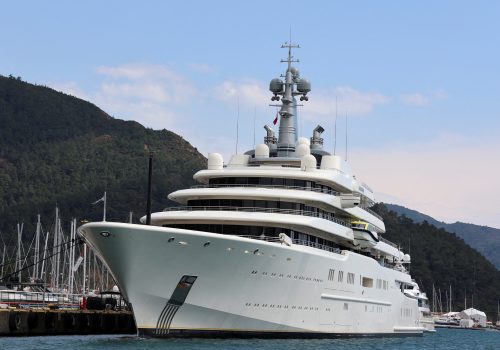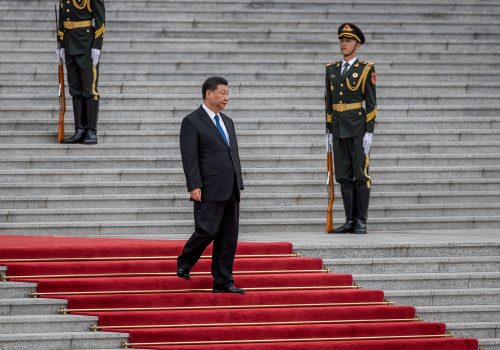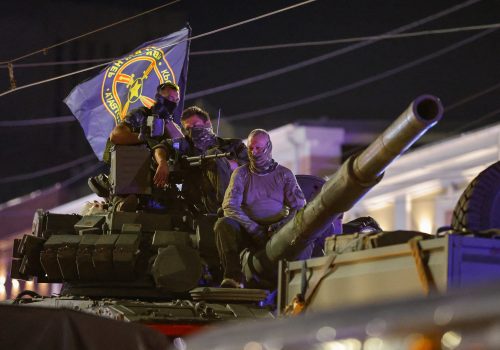No, Putin, the ISIS-K attack in Moscow wasn’t about Ukraine
Islamic State-Khorasan (ISIS-K) claimed responsibility for the horrific March 22 attack on a Moscow concert hall, which killed more than 130 people. Russian President Vladimir Putin, though, has claimed that the attack was somehow linked to Ukraine (which the Ukrainian government has hotly denied).
This attack is a reminder that Ukraine is not the only entity Russia is at war against. Although Moscow’s war against the Muslim breakaway region of Chechnya officially ended in 2009, Russia has experienced a number of jihadist attacks. This one is just the latest.
The Islamic State of Iraq and al-Sham (ISIS), it should be recalled, was what al-Qaeda in Iraq was renamed when it broke away from al-Qaeda central over leadership quarrels and policy issues. Although ISIS quickly came to control a large amount of territory in both eastern Syria and western Iraq, it was largely crushed by several forces, including the US military, Syrian Kurdish forces, Iraqi government troops, Iran-backed Iraqi Shia militias, and Iran’s Islamic Revolutionary Guards Corps (IRGC). Although Iran and its allies did not do so in cooperation with the United States, the fact that Tehran and Washington both regarded ISIS as an opponent is indicative of the depth of the rivalry between Shia and Sunni Islamists. But while the activities of the original ISIS became severely constrained, those of its affiliates—including ISIS-K—have expanded.
SIGN UP FOR THIS WEEK IN THE MIDEAST NEWSLETTER
This attack by ISIS-K, which operates primarily in Afghanistan and Pakistan, may have been motivated by several grievances, including retaliation for the Soviet occupation of Afghanistan. With ISIS-K now fighting against the ruling Taliban regime in Afghanistan, which has relatively good relations with Russia, the Moscow attack may have been intended to draw a distinction between how ISIS-K fights against a Russia that oppresses Muslims while the Taliban cooperates with it. Assuming that the four Tajiks Moscow arrested and accused of perpetrating the attack actually did so, they may have launched it in response to what they see as the oppression of the Russian-backed Tajik government. ISIS-K’s grievances against Russia, as well as those of many other jihadist groups, include Russian support for the Bashar al-Assad regime in Syria, as well as Russian cooperation with Iran and other Middle Eastern governments that Sunni jihadists regard as enemies. What does not seem to have motivated ISIS-K’s attack in Russia is any particular concern about Ukraine.
ISIS-K and other ISIS affiliates, of course, have launched attacks not just against Western and pro-Western governments but also against anti-Western governments, including Iran (whose Shia regime ISIS-K and other Sunni jihadists consider anathema) and the Taliban. It is not surprising that ISIS-K has also attacked Russia. Indeed, it would have been more surprising if it did not do so.
This attack is a reminder that the Ukraine war is not the only conflict Moscow is fighting; its “war on terror” is not over and could even revive. In fact, ISIS-K and similar groups might see Moscow’s war against Ukraine as making Russia less vigilant against, and more vulnerable to, jihadist attacks.
Some might see this jihadist attack at the concert hall as raising the possibility of some degree of cooperation between Russia and the West against a common threat. Putin, however, seems to have put paid to this notion. He rejected US warnings beforehand that a jihadist attack might take place. And even after finally admitting that “radical Islamists” were behind the attack, he still linked it to Western-backed Ukraine. This suggests that Putin is in no mood to rein in his hostility to Kyiv and the West, much less cooperate with them.
Indeed, Putin’s reaction to the March ISIS-K attack in Moscow is eerily similar to his response to the September 2004 jihadist attack in Beslan. Even then, Putin claimed that the West supported—and even sought to benefit from—the attack.
This suggests that Putin may be a “worst case” thinker, believing that if the West and Ukraine are opposed to Russia, and if jihadists are opposed to Russia, then the West, Ukraine, and the jihadists must all be working together. On the other hand, Putin may not care so much whether this is true, but believes that linking ISIS-K to Ukraine and the West will resonate with the Russian public. Opposition to his war in Ukraine can then be equated not just to support for Russia’s Western enemies, but its Muslim ones as well.
Russia’s conflict with Ukraine and its conflict with jihadist groups like ISIS-K, though, are separate. And as horrific as it was, the ISIS-K attack on a Moscow theater is not nearly as much of a challenge to Putin as the war in Ukraine, in which hundreds of thousands of Russians have been killed or wounded. But the potential for an expanded Russian conflict with Sunni jihadists exists as long as Russia supports those such jihadists oppose—such as the Assad regime in Syria, oppressive rulers in the former Soviet Muslim republics and the Muslim “autonomous” regions inside Russia itself, Shia Iran, and the Taliban. Putin may have not just one war on his hands, but two.
Mark N. Katz is a professor of government and politics at the George Mason University Schar School of Policy and Government and a nonresident senior fellow at the Atlantic Council.
Further reading
Thu, Mar 24, 2022
Action must be taken to award reparations to victims of Russian war crimes
MENASource By Jomana Qaddour, Celeste Kmiotek
The international community is overdue for an overhaul of the legal tools accessible to victims of state-sponsored crimes in the twenty-first century. Perhaps justice mechanisms for Ukraine and Syria can stymie such impunity once and for all.
Wed, Feb 23, 2022
China and Russia are proposing a new authoritarian playbook. MENA leaders are watching closely.
MENASource By Ahmed Aboudouh
It’s on major Western democracies to make democracy appealing again by aggressively filling the gaps China and Russia exploit to make the world more accommodating to their political models and the new trend of rising authoritarianism.
Wed, Jun 28, 2023
The Wagner rebellion is over—for now. But how will the events reverberate in the Middle East and North Africa?
MENASource By Mark N. Katz
The June 23-24 rebellion led by Wagner Group leader Yevgeny Prigozhin—aimed, he claimed, at replacing the Russian Defense Minister Sergei Shoigu and Chief of the General Staff Valery Gerasimov (not Russian President Vladimir Putin)—has ended. However, reverberations from it are likely to continue being felt beyond Russia, such as in the Middle East and North […]
Image: A woman lays flowers on the roadside in front of the burnt-out Crocus City Hall following a deadly attack on the concert venue on the outskirts of Moscow, Russia, March 26, 2024. REUTERS/Evgenia Novozhenina


